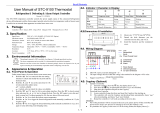
TECHNISONIC INDUSTRIES LIMITED
TDFM-9100 Installation Instructions TiL 13RE483 Rev. E
11
2.7 INSTALLATION - WIRING INSTRUCTIONS
Figures 4 – 8 show all required connections and recommended wire sizes for the TDFM-9100
transceiver. There are receive audio, mic audio, and PTT lines for each band as well as a set of
lines combining both bands. The TDFM-9100 can be wired such that band selection can be made
on the audio panel by wiring all bands individually to 2 (5 for MOD 14) separate positions on the
audio panel. If enough positions are not available, the TDFM-9100 can be alternately wired into
one position of the audio panel using the combined lines. In this case, band selection and audio
monitoring is done on the TDFM-9100 front panel. An installation can be wired in a combination
of both methods as all inputs and outputs are always active.
TDFM-9100 transcievers with MOD 14 have the capability to provide PTT, mic and headset for up
to 2 (Bands 4 and 5), remote handheld transceivers, and/or a Latitude Technologies S200-P12
satphone / PTT network com transceiver. Connectors P1 and J2 provide the MOD 14 interface.
See Table 4 for a list of recommended interface cables for various hand-held transceivers. MOD
14 also has provisions for an internal analog module (Band 3). A digital audio port has been
added to interface with the Technisonic TDAP-650 and TDAP-750 digital audio panels.
2.8 MAIN GROUND – J1 PINS 1 AND 14
Both pins should be connected to power ground. These pins are internally connected to the
chassis.
2.9 MAIN POWER + 28 V
DC
– J1 PINS 2 AND 15
Both pins should be connected to +28 volts DC +/- 15%.
2.10 MIC 1, 2, 3, 4 and 5 – J1 PINS 3, 6, P1 PIN 6, J1 PINS 19 AND 22
The microphone input signals shall be connected using shielded wire with the shield connected to
ground (pin 1 or 14). For best results, it is recommended to leave the other end of the shield
floating to prevent ground currents unless you are connecting to an audio panel with floating hi
and lo inputs (for example the Technisonic A711 or A711L) in which case the shield must be
connected to the lo input. These are individual inputs for each band.
2.11 MIC COMBINED – J1 PIN 9
The combined mic inputs should be wired and shielded as the individual mic inputs above. This
mic input can be used for any band. Band selection is made at the TDFM-9100 front panel.
2.12 AUDIO 1, 2, 3, 4 AND 5 – J1 PINS 4, 7, P1 PIN 5, J1 PINS 20 AND 23
These are individual audio outputs from each band. All outputs are 600 ohms impedance. The
output power is 600 mW maximum. Unused outputs do not have to be terminated and should be
left unconnected.
2.13 AUDIO COMBINED – J1 PIN 10
This is combined audio output from any or all bands as selected from the front panel. The
specifications are the same as the individual outputs above.
2.14 PTT 1, 2, 3, 4 AND 5 – J1 PINS 5, 8, P1 PIN 3, J1 PINS 21 AND 24
This refers to individual PTT lines for each band. These lines should be floating when in receive
and grounded for transmit. The input has a pull up resistor to 5 volts. Connecting an audio panel
that wishes to see more may result in no receive audio. Connect a 1N4006 diode in series with
the cathode towards the audio panel in this case.


























